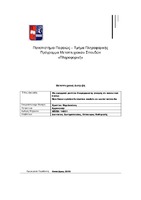Μη γραμμικά μοντέλα διαμόρφωσης γνώμης στα κοινωνικά δίκτυα
Non-linear opinion-formation models on social networks

Προβολή/
Λέξεις κλειδιά
Μη γραμμικά μοντέλα ; Non linear models ; Κοινωνικά δίκτυαΠερίληψη
Τα κοινωνικά δίκτυα έχουν σημαντική επίδραση στη συμπεριφορά των ανθρώπων και στη γνώμη
τους. Για το λόγο αυτό, προκειμένου να διερευνηθεί ο ρόλος των δικτύων αυτών στην κοινωνική
συμπεριφορά, έχουν αναπτυχθεί στο παρελθόν πολλά μαθηματικά μοντέλα κοινωνικών δικτύων.
Η έρευνα για τη δυναμική της κοινής γνώμης ακολουθεί κατά κύριο λόγο δύο είδη μοντέλων, τα
μοντέλα βασισμένα στη στατιστική φυσική και τα μοντέλα που βασίζονται σε δεδομένα. Ο πρώτος
τύπος μοντέλων είναι παραδοσιακά σχεδιασμένος για να συλλάβει πολλά ρυθμιστικά φαινόμενα
της πραγματικής ζωής. Ωστόσο, αυτά τα μοντέλα είναι σχεδόν μηχανογραφημένα και ως εκ
τούτου οι παράμετροί τους είναι δύσκολο να προσδιοριστούν από τη συγκέντρωση λεπτομερών
πραγματικών δεδομένων. Η δεύτερη κατηγορία μοντέλων, που είναι εντυπωσιακά λίγα, επιχειρεί
να ξεπεράσει αυτούς τους περιορισμούς με την εκμάθηση ενός γραμμικού μοντέλου ανίχνευσης
από τα μεταβαλλόμενα δυναμικά στοιχεία της γνώμης. Οι περισσότερες από αυτές τις
προσεγγίσεις δεν εξετάζουν την πρόβλεψη γνώμης σε απροσδιόριστη χρονικά μελλοντική στιγμή
για την αξιολόγηση της χρησιμότητας των μοντέλων τους. Αντίθετα, επικεντρώνονται στην κοντινή
πρόβλεψη, επιδιώκοντας να προβλέψουν για την επόμενη χρονική στιγμή τη διαμόρφωση μίας
γνώμης. Στην παρούσα εργασία μελετώνται τα μοντέλα διαμόρφωσης γνώμης, με έμφαση στα
μη γραμμικά μοντέλα, για τα οποία διενεργείται μια βιβλιογραφική ανασκόπηση, ενώ παράλληλα
επικεντρώνεται στην ανάλυση του αλγορίθμου Non-linear DeGroot, όπου εκτελέστηκε
προσομοίωση ενός συστήματος δύο πρακτόρων.


